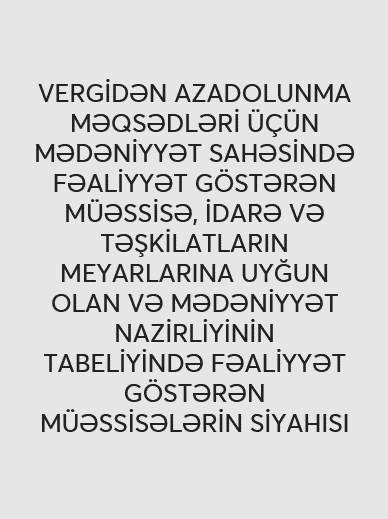‘Culture for Climate: Engaging Youth to Effect Behavioural Change’ Panel Session Takes Place
A panel session on "Culture for Climate: Engaging Youth to Effect Behavioural Change" was held on November 19 as part of the COP29 in Baku.
This panel was co-organized by the Heydar Aliyev Foundation, IDEA (International Dialogue for Environmental Action), ICESCO (Islamic World Educational, Scientific and Cultural Organization), and the Ministry of Culture of the Republic of Azerbaijan.
First, Martin Newman, founder of the Newman Partnership, provided information about the topic of the panel and introduced the speakers. There was a video presentation on the "Culture for Climate" (C4C) initiative put forward by our country.
Later, Aruna Francesca Maria Gujral, Director General of the International Centre for the Study of the Preservation and Restoration of Cultural Property (ICCROM); Dr. Salim M. Al Malik, Director General of ICESCO, President of the Petra National Trust, and UNESCO Goodwill Ambassador for Cultural Heritage; Princess Dana Firas of the Hashemite Kingdom of Jordan; and Soltan Mammadov, Member of Parliament and Head of the International Relations Department of the Heydar Aliyev Foundation, delivered speeches.
The speeches touched on the inspiring and transformative role of cultural projects, tools, and practitioners, and the role of the Group of Friends of Culture-Based Climate Action (GFCBCA) and Azerbaijan's new global initiative, Climate for Culture (C4C), in showcasing these efforts and amplifying the power of culture as a catalyst for behavior change worldwide.
It was noted that, according to research, around 72% of greenhouse gas emissions could be attributed to individual behavior and choices. This suggests that, alongside financial mechanisms for mitigation and adaptation and ambitious targets and pledges to reduce emissions, a decisive change in human behavior must be seen as one of the most important levers in tackling the climate crisis. Culture, which has played a central role throughout human history in transmitting the values that guide our behavior, now has a central role at local, national, regional, and global levels in establishing and modeling the fundamental behavioral changes without which our efforts to tackle the climate crisis will be severely hampered. Until recently, there have been relatively limited attempts to address the much-needed shift towards climate-positive and climate-resilient behavior. However, there is now an opportunity for this to change.
It was pointed out that the Group of Friends of Culture-Based Climate Action (GFCBCA), recently strengthened by a surge of new members—including national ministries of culture, institutional representatives from intergovernmental bodies, and NGOs—solidified its relevance at COP29. This was marked by the successful adoption of the Terms of Reference for the Group's work during the Second High-Level Ministerial Dialogue on Culture-Based Climate Action in Baku.
During the discussions, it was highlighted that in the year of its COP Presidency, the Government of Azerbaijan has supported efforts to strengthen the voice of culture in the climate debate by announcing the launch of the Culture for Climate (C4C) initiative, a new platform for research, dialogue, and active promotion of innovative cultural projects from around the world that have the power to change our perspectives and human behavior.
At the end of the event, questions from the audience were answered, and a group photo was taken.












